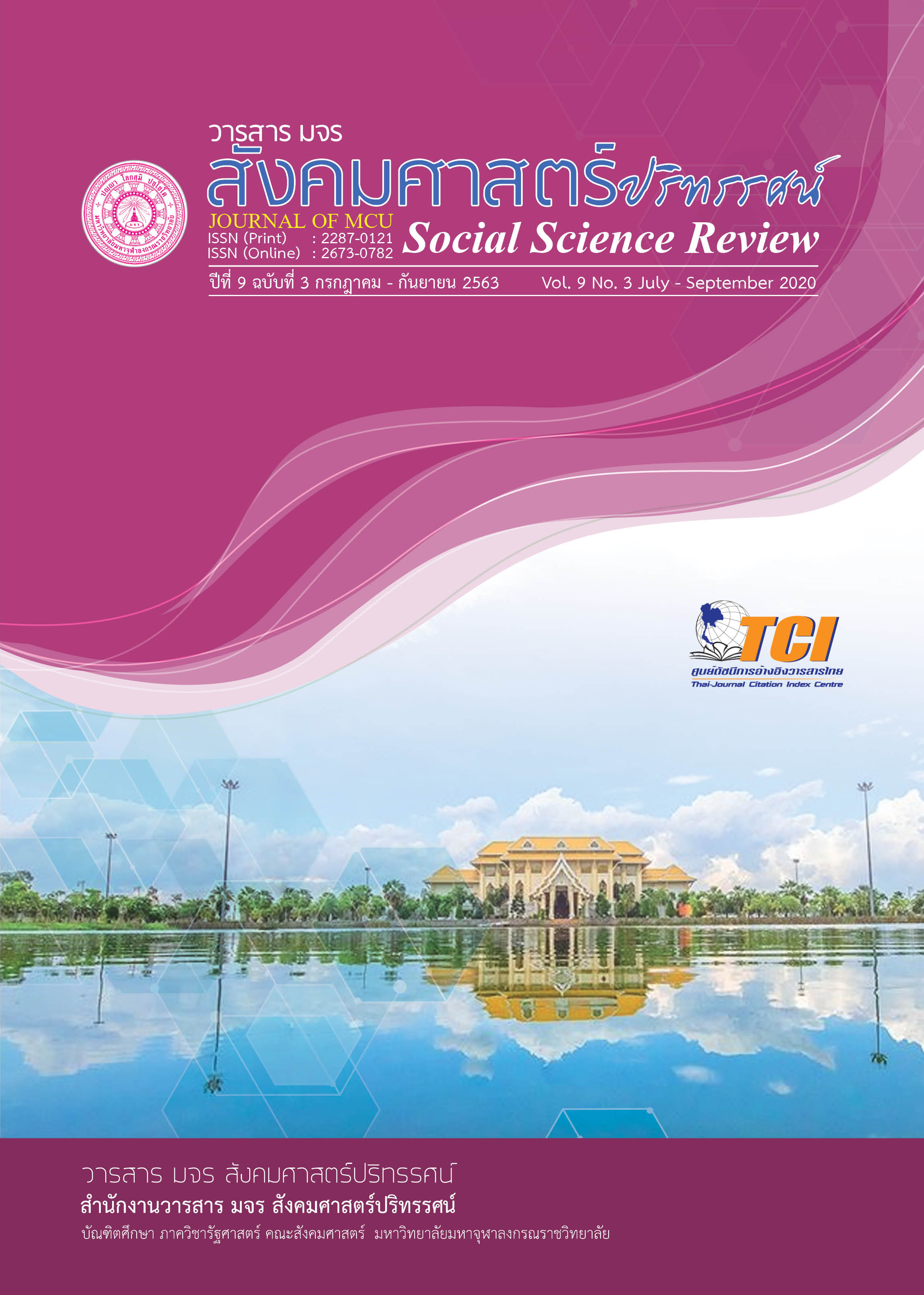การพัฒนาสมรรถนะเจ้าอาวาสตามหลักพุทธธรรม เพื่อการบริหารกิจการคณะสงฆ์ในจังหวัดจันทบุรี
คำสำคัญ:
การพัฒนาสมรรถนะ, เจ้าอาวาส, การบริหารกิจการคณะสงฆ์บทคัดย่อ
บทความวิจัยนี้มีวัตถุประสงค์เพื่อศึกษาสมรรถนะเจ้าอาวาส ศึกษาองค์ประกอบในการพัฒนาสมรรถนะเจ้าอาวาส และเสนอแนวทางการพัฒนาสมรรถนะเจ้าอาวาส เป็นการวิจัยแบบผสานวิธี พบว่า สมรรถนะของเจ้าอาวาส คือ มีความสามารถในการจัดระบบความเป็นอยู่ของพระภิกษุ สามเณร และคฤหัสถ์ภายในวัด สอนพระปริยัติธรรมแผนกบาลีและธรรมศึกษา เผยแผ่เชิงรุก จัดตั้งกองทุน มอบทุนการศึกษา จัดซื้อวัสดุอุปกรณ์การสอน จัดตั้งกองทุนสังฆะประชานุเคราะห์ กองทุนสัจจะสะสมทรัพย์ และจัดตั้งกองทุนกองบุญสุขภาวะ องค์ประกอบของสมรรถนะเจ้าอาวาส ประกอบด้วย 1) มุ่งผลสัมฤทธิ์เจ้าอาวาส 2) บริการที่ดี ใส่ใจในการให้ความสะดวก 3) ศึกษาหาความรู้เพื่อให้สามารถนำมาประยุกต์ใช้ได้ 4) ทำงานเป็นทีม 5) ยึดมั่นในความชอบธรรม และแนวทางการพัฒนาสมรรถนะเจ้าอาวาสใช้วิธีอบรมสัมมนาสร้างระบบและหลักเกณฑ์ ด้านการบริการที่ดี พัฒนาโดยการจัดประชุมสัมมนาเพื่อให้สามารถให้การสงเคราะห์แก่พุทธศาสนิกชนอย่างเหมาะสม แลกเปลี่ยนเรียนรู้ เพื่อให้นำความรู้ที่ได้รับไปปรับใช้ได้มากขึ้น สร้างบรรยากาศในการทำงานที่ดี จัดกิจกรรมที่ก่อให้เกิดความสุขในการปฏิบัติงาน เพื่อสร้างขวัญกำลังใจในการทำงาน พัฒนาโดยส่งเสริมให้เจ้าอาวาสตระหนักและปฏิบัติตามนโยบายของคณะสงฆ์ เพื่อเป็นการเสริมสร้างและพัฒนาเจ้าอาวาสให้มีทัศนคติที่ดีต่อการปฏิบัติงาน
เอกสารอ้างอิง
ประโยชน์ คล้ายลักษณ์. (2556). รูปแบบการพัฒนาสมรรถนะด้านการทำงานเป็นทีมของบุคลากรทางการศึกษาผู้ปฏิบัติงานในสำนักงานเขตพื้นที่การศึกษาประถมศึกษา. วารสารศึกษาศาสตร์ มหาวิทยาลัยนเรศวร, 15(ฉบับพิเศษ), 137-145.
พระครูวิสุทธานันทคุณ (สุรศักดิ์ วิสุทฺธาจาโร). (2557). การบริหารวัดเพื่อความมั่นคงแห่งพระพุทธศาสนาของคณะสงฆ์ภาค 15 (วิทยานิพนธ์พุทธศาสตรดุษฎีบัณฑิต สาขาวิชาการจัดการเชิงพุทธ). พระนครศรีอยุธยา: มหาวิทยาลัยมหาจุฬาลงกรณราชวิทยาลัย.
พระครูสังฆรักษ์ปัญญาพล ปญฺญาพโลและคณะ. (2562). กลไกการพัฒนาศักยภาพในการปฏิบัติงานของพระวินยาธิการ จังหวัดพระนครศรีอยุธยา. วารสาร มจร สังคมศาสตร์ปริทรรศน์, 8(4), 49-60.
พระราชรัตนเวที (ประเสริฐ โชติธมฺโม). (2560). รูปแบบการพัฒนาสมรรถนะทางการบริหารจัดการของพระสังฆาธิการในเขตปกครองคณะสงฆ์ภาค 4. วารสาร มจร สังคมศาสตร์ปริทรรศน์, 2(6ฉบับพิเศษ), 523-537.
ไพบูลย์ เสียงก้อง. (2544). หลักการบริหารงานในวัด. กรุงเทพฯ: โรงพิมพ์กรมการศาสนา.
ลิขิตา เฉลิมพลโยธินและคณะ. (2560). ภาวะผู้นำกับการพัฒนาองค์การโดยใช้หลักพรหมวิหาร 4. วารสารวิชาการมหาวิทยาลัยธนบุรี, 26(11), 162-171.
สาธิต พนารี. (2561). กระบวนทัศน์ใหม่การบริหารกิจการคณะสงฆ์ในยุคโลกาภิวัตน์. วารสารวิชาการมหาวิทยาลัยราชภัฏพระนคร, 9(1), 82-92.
สายฝน เจริญรัมย์. (2560). การบริหารงานตามหลักพรหมวิหาร 4 ของสถานศึกษาอำเภอชุมพลบุรี จังหวัดสุรินทร์ สังกัดสำนักงานเขตพื้นที่การศึกษามัธยมศึกษา เขต 33. Academic Journal of Mahamakut Buddhist University Roi Et Campus, 6(1), 41-50.
สำนักงานคณะกรรมการการศึกษาแห่งชาติ. (2544). คู่มือการประเมินผลภายในของสถานศึกษาตามมาตรฐานการศึกษา การออกแบบระบบประเมินผลภายใน. กรุงเทพฯ: สำนักงานคณะกรรมการการศึกษาแห่งชาติ.
สำนักงานคณะกรรมการข้าราชการพลเรือน. (2548). คู่มือสมรรถนะข้าราชการพลเรือน. กรุงเทพฯ: สำนักงานคณะกรรมการข้าราชการพลเรือน.
อัจฉรา หล่อตระกูล. (2557). การพัฒนาสมรรถนะพนักงานมหาวิทยาลัยของรัฐ (วิทยานิพนธ์พุทธศาสตรดุษฎีบัณฑิต สาขาวิชารัฐประศาสนศาสตร์). พระนครศรีอยุธยา: มหาวิทยาลัยมหาจุฬาลงกรณราชวิทยาลัย.
ดาวน์โหลด
เผยแพร่แล้ว
รูปแบบการอ้างอิง
ฉบับ
ประเภทบทความ
สัญญาอนุญาต
ลิขสิทธิ์ (c) 2020 วารสาร มจร สังคมศาสตร์ปริทรรศน์

อนุญาตภายใต้เงื่อนไข Creative Commons Attribution-NonCommercial-NoDerivatives 4.0 International License.
เพื่อให้เป็นไปตามกฎหมายลิขสิทธิ์ ผู้นิพนธ์ทุกท่านต้องลงลายมือชื่อในแบบฟอร์มใบมอบลิขสิทธิ์บทความให้แก่วารสารฯ พร้อมกับบทความต้นฉบับที่ได้แก้ไขครั้งสุดท้าย นอกจากนี้ ผู้นิพนธ์ทุกท่านต้องยืนยันว่าบทความต้นฉบับที่ส่งมาตีพิมพ์นั้น ได้ส่งมาตีพิมพ์เฉพาะในวารสาร มจร สังคมศาสตร์ปริทรรศน์ เพียงแห่งเดียวเท่านั้น หากมีการใช้ภาพหรือตารางหรือเนื้อหาอื่นๆ ของผู้นิพนธ์อื่นที่ปรากฏในสิ่งตีพิมพ์อื่นมาแล้ว ผู้นิพนธ์ต้องขออนุญาตเจ้าของลิขสิทธิ์ก่อน พร้อมทั้งแสดงหนังสือที่ได้รับการยินยอมต่อบรรณาธิการ ก่อนที่บทความจะได้รับการตีพิมพ์ หากไม่เป็นไปตามข้อกำหนดเบื้องต้น ทางวารสารจะถอดบทความของท่านออกโดยไม่มีข้อยกเว้นใดๆ ทั้งสิ้น





